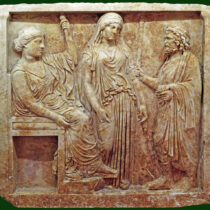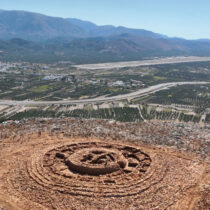Project description
Greek Mycenaean monumental architecture has been well-studied. However, the extent to which large-scale building programmes contributed to the socioeconomic and political changes and crises that took place in Late Bronze Age Greece (c.1600-1100 BC) has not been studied. The project aims to investigate human and natural resources which interacted in the core regions of Mycenaean Greece. There, elites mobilized these resources to implement their monumental building programmes. It seeks to reveal how and why these constructions were accomplished, and what impact such large-scale prolonged building programmes had on the population over time. Methodologically, practical building processes and inherent social practices are captured via an interdisciplinary methodology consisting of econometric, statistic, anthropological and theoretical approaches. This combination of approaches is novel in its scope because it brings together in a unique way the wide range of scattered data available on many aspects of human ecology and past economies of the region. As such, multi-layered data sets will illuminate the many interconnected networks of human and resource interactions that impacted on people’s day-to-day activities, first, but also on the economic, cultural and socio-political situations over time in these regions. The local Mycenaean phenomena governing this period will be embedded into the much wider ongoing debate of the societal ‘collapse’ indicative of the final phases of the Late Bronze Age in the East Mediterranean more generally in order to understand which role it played on this much larger scale. As such, this project contributes in demonstrating the long-term insights archaeological research achieves in studying and understanding very human issues, and it illustrates the contemporary relevance of archaeological studies today and for the future.
As a member of a larger team each PhD position is embedded within the SETinSTONE programme, funded by an ERC Consolidator Grant, and supervised by Dr. Ann Brysbaert.
Key responsibilities
-To write a PhD;
-To present papers at national and international conferences and workshops as required by the project (individual and/or co-authored);
-To submit research results for publication in peer-reviewed journals (individual and/or co-authored);
-To submit research results for their incorporation in a synthetic publication and the proceedings of the International Conference, both edited by the PI;
-To take part in PhD training offered by the Faculty and through field schools where appropriate and needed;
-To undertake/participate in limited teaching in year 2 and 3 of the appointment;
-To participate in the Faculty’s workshops, reading and discussion groups;
-To participate in yearly meetings-workshops organised by the ERC project and in regular supervision sessions with the supervisor(s);
-To contribute and participate in the International Conference held at Leiden in year 5 of the project (year after the PhD is finished).
Vacancy number 15-228, specific project task: The architectural energetics of monumental Cyclopean architecture in Mycenaean Greece
This PhD project, PhD 1, seeks to investigate the technological processes of acquiring, transporting, and constructing monumental cultural commodities mainly in stone work, and trace the builders’ communicative and logistical strategies
Vacancy number 15-229, specific project task: The architectural energetics of earthwork architecture in Mycenaean Greece
This specific PhD project, PhD 2, seeks to investigate the technological processes of acquiring, transporting, and constructing monumental cultural commodities in earth work, sometimes combined with stone.
Vacancy number 15-230, specific project task: A holistic human and other resources assessment for late MBA-LBA Mycenaean Greece
This project, PhD 3, will study the Argive Plain to obtain an updated and more holistic understanding of the socio-economic mosaic of the Mycenaean societies in the Argive Plain, its changes over time and the subsistence and other support it may have provided to its population.
Selection criteria
The project seeks to employ a highly motivated and proactive candidate who will need to work both independently and as part of a larger team. S/he is willing to travel between the Netherlands and Greece, and is willing to stay for periods in Greece to carry out research in libraries and archives, and when required, fieldwork, for which training and equipment will be provided. The candidate will be part of a larger team consisting of 3 PhD candidates, two postdocs and the PI, will work together with the group on a day-to-day basis at the Faculty of Archaeology, and will regularly present her/his findings in this group and beyond.
Crucial
-Degrees (BA/BSc. and MA/MSc.) in archaeology with a specific focus on East Mediterranean and/or Aegean Bronze/Iron Age Archaeology;
-An explicit interest in prehistoric (monumental) architecture, material culture and landscape studies;
-Excellent verbal and written communication skills;
-The MA/MSc. Thesis shows well-developed research skills (both analytical and descriptive). The ability to work with statistical packages and databases is a great advantage and the thesis should have received a grade of minimally 8.0 on a ten-point scale, or its international equivalent;
-The PhD research needs to result in a doctor’s degree and should to be undertaken, finished and ready for publication within 4 years;
-An excellent command of English (reading, understanding, speaking, writing) and a strong command of German (reading, understanding), and modern Greek (reading, speaking, understanding) or willing to commit taking intensive classes in modern Greek in year one of the PhD and as long as it takes to converse and read it well;
-Valid European driving license (as candidate will be expected to transport materials)
Desirable
-Relevant working experience in the field, well-developed GIS skills;
-Other modern language skills (French) are useful;
-Relevant publications.
The faculty
The future of the past begins in Leiden. The Faculty of Archaeology is internationally leading for its research, home to a broad array of specializations and notable for the strong connection it fosters between teaching and research. Home to over 500 students in the multidisciplinary world of Archaeology, the Faculty and its researchers from all areas of the Archaeological field determine the future of archaeological research.
Terms & conditions
We offer a full-time position for 1,0 fte (38 hours per week), the start date is January 1, 2016. The appointment as a PhD student will be for a period of four years (initially for a period of one year with an extension of three years after positive evaluation of progress and skills development) leading to the successful completion of a PhD thesis and its publication within these four years. The appointment will be under the terms of the cao (Collective Labour Agreement) of Dutch Universities
The gross monthly salary is set on € 2.125,- in the first year, increasing to € 2.717,- gross per month in the final year.
Leiden University offers an attractive benefits package with additional holiday (8%) and end- of-year bonuses (8.3 %), training and career development and sabbatical leave. Our individual choices model gives you some freedom to assemble your own set of terms and conditions. Candidates from outside the Netherlands may be eligible for a substantial tax break.
Information
Enquiries can be made to Dr. Ann Brysbaert ([email protected]).
Information about The Faculty of Archaeology can be found at http://www.archaeology.leiden.edu/ and about Leiden University at www.leiden.edu.
Information on the advanced research qualification and research programmes of the Graduate School of Archaeology can be found on: http://archaeology.leiden.edu/graduate-school/phd-programme/.
Applications
To apply for one of these vacancies, please send an email to Mrs. Yvonne Haring; [email protected] and ensure that you upload the following additional documents in pdf format quoting the correct vacancy number (15-228 / 15-229 / 15-230) for the post you are interested in.
Note: you cannot apply for all three posts in one application, but people with a keen interest in posts 1 and 2 can apply for both. However, two completely separate applications with all required documentation (see below) need to be submitted in order to be considered:
-A cover letter (max 2 pages) stating how your skills and experience relate to the selection criteria and project description above;
-A short research proposal including short bibliography (max 3 pages) in relation to the advertised position and its specifics;
-Your curriculum vitae (CV), including publications if applicable;
-Your master thesis or other major writing sample;
-Copies of your academic transcripts (BA/BSc., MA/MSc.);
-If your native language is not English, proof of your English language proficiency since the thesis will need to be written in English;
-The names and contact details (with emails) of three academic referees who know your work well; one should be your MA thesis supervisor.
Only applications received per email at the latest on August 31, 2015 can be considered.
The selection procedure will take place in mid-September/early October 2015, and selected candidates will be invited for an interview (in person or over Skype) in early November 2015.






